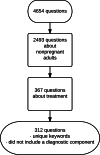An experimental search strategy retrieves more precise results than PubMed and Google for questions about medical interventions
- PMID: 25922798
- PMCID: PMC4411517
- DOI: 10.7717/peerj.913
An experimental search strategy retrieves more precise results than PubMed and Google for questions about medical interventions
Abstract
Objective. We compared the precision of a search strategy designed specifically to retrieve randomized controlled trials (RCTs) and systematic reviews of RCTs with search strategies designed for broader purposes. Methods. We designed an experimental search strategy that automatically revised searches up to five times by using increasingly restrictive queries as long at least 50 citations were retrieved. We compared the ability of the experimental and alternative strategies to retrieve studies relevant to 312 test questions. The primary outcome, search precision, was defined for each strategy as the proportion of relevant, high quality citations among the first 50 citations retrieved. Results. The experimental strategy had the highest median precision (5.5%; interquartile range [IQR]: 0%-12%) followed by the narrow strategy of the PubMed Clinical Queries (4.0%; IQR: 0%-10%). The experimental strategy found the most high quality citations (median 2; IQR: 0-6) and was the strategy most likely to find at least one high quality citation (73% of searches; 95% confidence interval 68%-78%). All comparisons were statistically significant. Conclusions. The experimental strategy performed the best in all outcomes although all strategies had low precision.
Keywords: Evidence-based medicine; Google; Information retrieval; PubMed.
Conflict of interest statement
Dr Badgett created SUMSearch, which is the basis for the experimental search strategies. Dr Badgett receives no compensation for this project or for SUMSearch.
Figures
Similar articles
-
Folic acid supplementation and malaria susceptibility and severity among people taking antifolate antimalarial drugs in endemic areas.Cochrane Database Syst Rev. 2022 Feb 1;2(2022):CD014217. doi: 10.1002/14651858.CD014217. Cochrane Database Syst Rev. 2022. PMID: 36321557 Free PMC article.
-
Google Versus PubMed: Comparison of Google and PubMed's Search Tools for Answering Clinical Questions in the Emergency Department.Ann Emerg Med. 2020 Mar;75(3):408-415. doi: 10.1016/j.annemergmed.2019.07.003. Epub 2019 Oct 14. Ann Emerg Med. 2020. PMID: 31623934 Review.
-
Sensitivity and predictive value of 15 PubMed search strategies to answer clinical questions rated against full systematic reviews.J Med Internet Res. 2012 Jun 12;14(3):e85. doi: 10.2196/jmir.2021. J Med Internet Res. 2012. PMID: 22693047 Free PMC article. Review.
-
Development of a highly sensitive search strategy for the retrieval of reports of controlled trials using PubMed.Int J Epidemiol. 2002 Feb;31(1):150-3. doi: 10.1093/ije/31.1.150. Int J Epidemiol. 2002. PMID: 11914311
-
Identification of the Best Semantic Expansion to Query PubMed Through Automatic Performance Assessment of Four Search Strategies on All Medical Subject Heading Descriptors: Comparative Study.JMIR Med Inform. 2020 Jun 4;8(6):e12799. doi: 10.2196/12799. JMIR Med Inform. 2020. PMID: 32496201 Free PMC article.
Cited by
-
A simple heuristic for Internet-based evidence search in primary care: a randomized controlled trial.Adv Med Educ Pract. 2016 Aug 4;7:433-41. doi: 10.2147/AMEP.S78385. eCollection 2016. Adv Med Educ Pract. 2016. PMID: 27563264 Free PMC article.
-
Automated Summarization of Publications Associated with Adverse Drug Reactions from PubMed.AMIA Jt Summits Transl Sci Proc. 2016 Jul 20;2016:68-77. eCollection 2016. AMIA Jt Summits Transl Sci Proc. 2016. PMID: 27570654 Free PMC article.
References
-
- AAMC-HHMI Scientific Foundation for Future Physicians Committee . Scientific Foundations for Future Physicians. 2009.
-
- American College of Physicians 2014. ACP smart medicine. Philadelphia: American College of Physicians. Available at http://smartmedicine.acponline.org (accessed 5 May 2014)
-
- Anders ME, Evans DP. Comparison of PubMed and Google scholar literature searches. Respiratory Care. 2010;55(5):578–583. - PubMed
-
- Badgett RG. How to search for and evaluate medical evidence. Seminars in Medical Practice. 1999;2(3):8–14.
Grants and funding
LinkOut - more resources
Full Text Sources
Other Literature Sources



